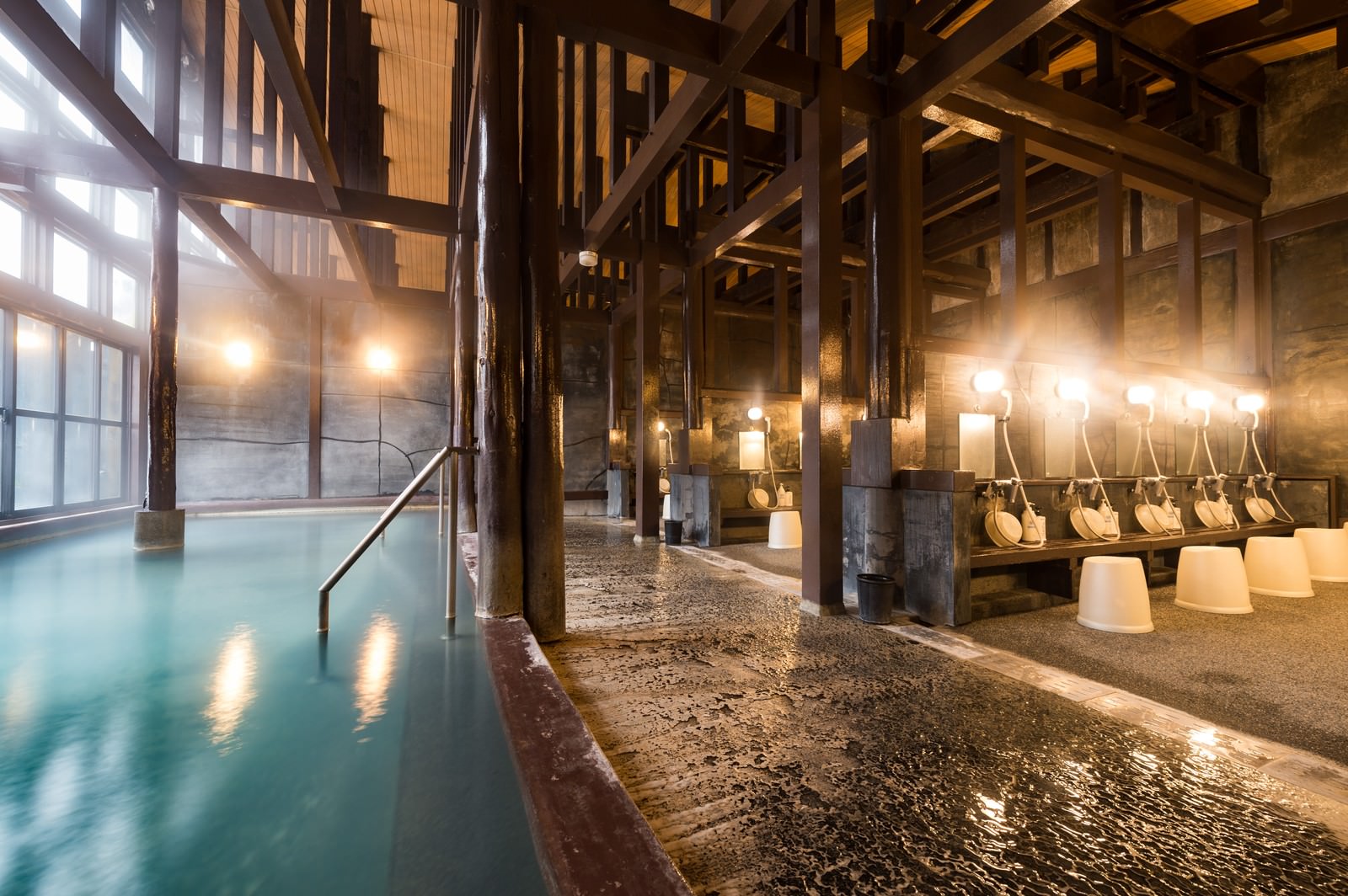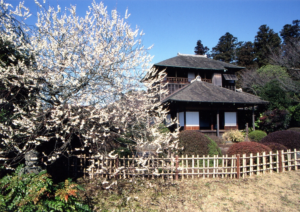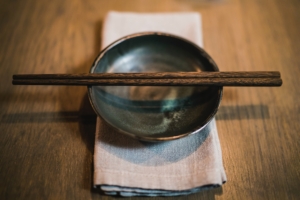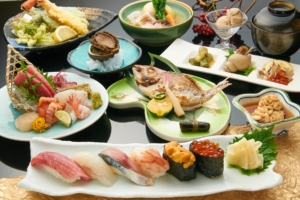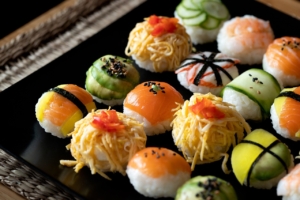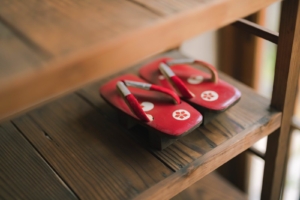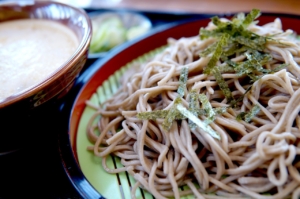When you visit Japan, I highly recommend experiencing Japanese onsens (温泉). The Japanese archipelago is home to numerous onsens that spring forth from the rich natural environment, and the natural onsen water that bubbles up from underground is expected to have health benefits and relaxation effects.
Japanese onsen resorts and ryokans offer various types of bath water with different minerals, allowing you to enjoy the blessings of nature in diverse ways. Onsen has the effect of warming the body, promoting blood circulation, and recovering from fatigue, and certain mineral types may improve conditions like rheumatism and neuralgia. For this reason, Japanese people have incorporated the healing powers of onsens into their daily lives for centuries.
In Japan, people of all ages and genders enjoy onsens, but there are several manners to follow when entering a Japanese onsen.
What is the etiquettes/rules of Japanese onsens (Hot springs)?
Onsens are shared spaces used by many people, and etiquette is required to maintain hygiene and a comfortable environment. By following these onsen etiquettes, not only can other users enjoy their time, but you can also deepen your understanding of Japanese onsen culture, leading to a richer experience.
What should you bring to the onsen?
When going to an onsen, it’s good to prepare a large towel, a small towel, shampoo, body soap, and a change of clothes if necessary. Many onsen facilities provide shampoo and soap in the bath area. If you are staying at a ryokan, you can bring the towels provided in your room.
The large bath towel is used to dry off after bathing, while the small towel is used to wash your body, lightly dry off after bathing, and even to cover yourself in the onsen (you might wonder, “How can I cover myself with such a small towel?”).
Some onsen facilities may prohibit bringing your own shampoo and body soap, so it’s wise to check in advance.
What is the dress code? Can I have clothes on?
In Japanese onsens, wearing a bathing suit is generally prohibited, and bathing nude is common. Since the onsen water is shared, due to hygiene concerns and consideration for others, even if your bathing suit is clean, it is not allowed to be immersed in the water. This also applies even to small bikini styles.
Japanese onsen culture is deeply rooted in the concepts of therapeutic bathing and spiritual purification and has a long history. Bathing nude is not just about exposing the body; it also has a spiritual aspect of liberating the soul. Traditionally, onsens have been places of purification, serving to cleanse the body and reset the mind. Additionally, entering an onsen has a religious connotation, seen as an act of purifying the mind and body and wishing for health.
In the bath area, you can use your small towel meant for washing to cover your body if you’d like.
However, in large facilities located in tourist spots or resorts, bathing suits may be allowed.
Do not bring food and drinks
Many onsen facilities prohibit bringing food and drinks into the bathing area to maintain cleanliness and hygiene. If you wish to enjoy a meal or beverage, find designated areas for dining.
Avoiding mistakes at the onsen entrance
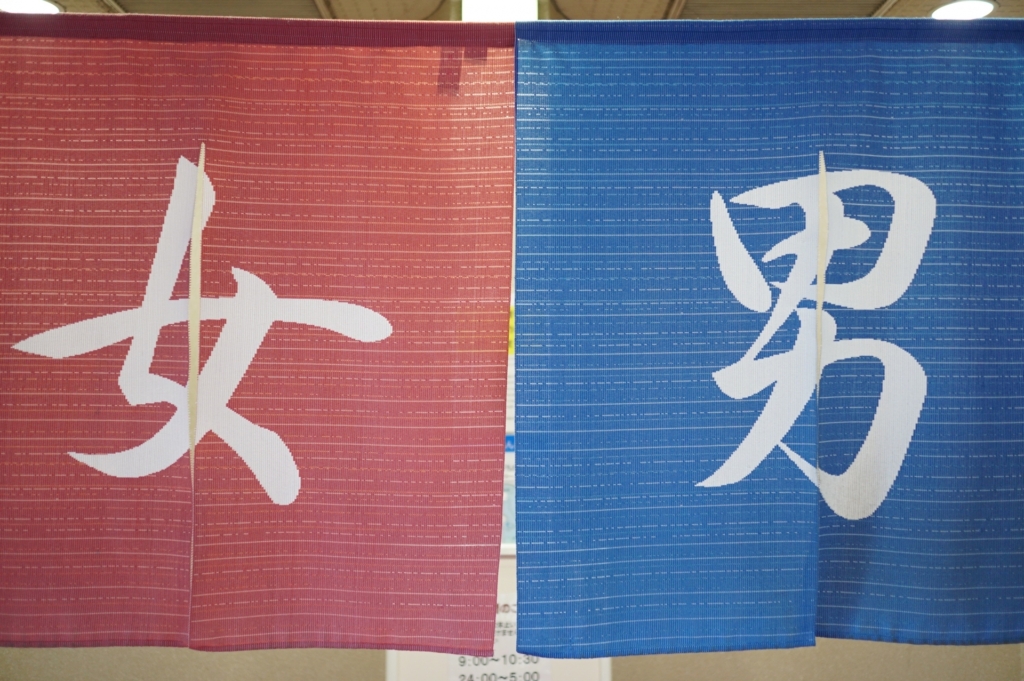
At the entrance of most onsen facilities, there is a short curtain called a “noren (暖簾),” which serves as a sign indicating the men’s and women’s baths. Each entrance has kanji for “男” (otoko: male) or “女” (onna: female), so it is a good idea to remember these for identification.
The kanji for “湯” means “hot water.”
Traditionally, the noren (curtains) for the men’s section are often blue or navy, and may display not only the character for “男” (man) but also phrases like “男湯” (bath for men), “殿方” (gentlemen), or simply “殿” (gentleman). For the women’s section, the noren are typically pink or red, featuring “女” (woman), along with phrases such as “女湯” (bath for women), “婦人” (ladies), or “姫” (princess).
In small ryokans, there may only be one bath, and in such cases, it is common to have designated usage times for men and women, so it is important to check carefully.
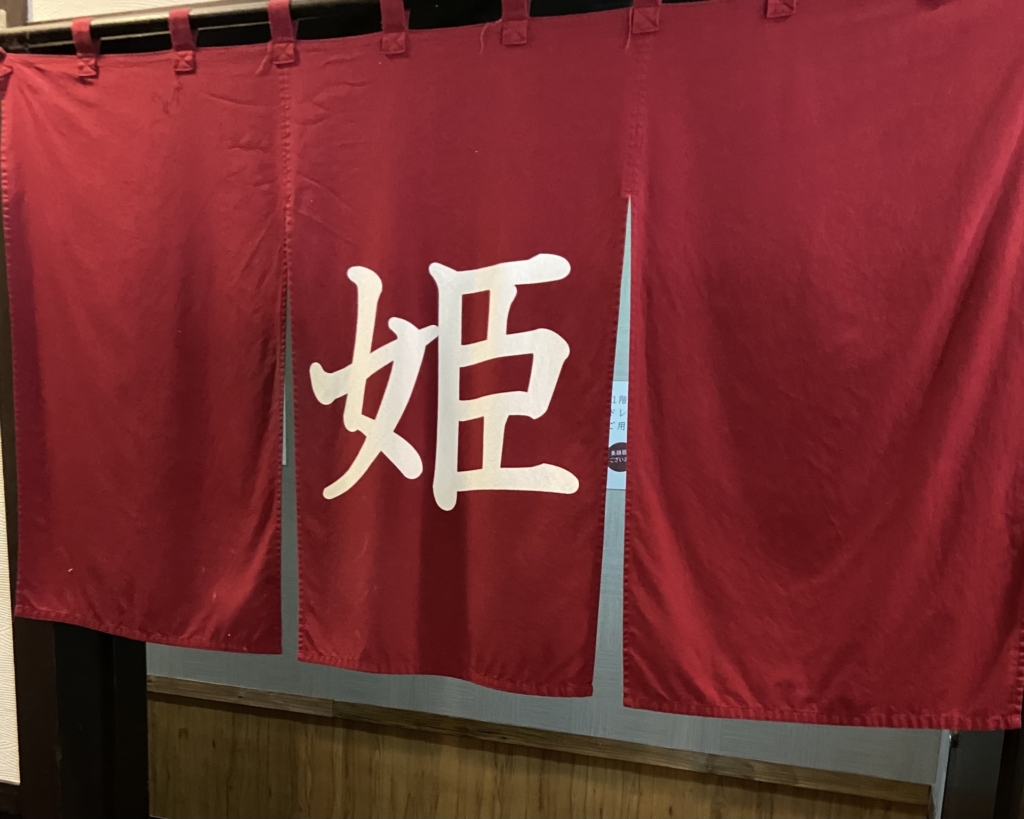
Entering the changing room
Once you pass through the noren, you will immediately find the changing area. Place your clothes and towel in an available locker and prepare for your bath. In traditional onsens or small local facilities, there may not be lockers, only baskets. In this case, place your clothes and towel in an empty basket and head to the bathing area. These onsens offer a chance to enjoy an old-fashioned atmosphere, but it’s important to manage your valuables carefully.
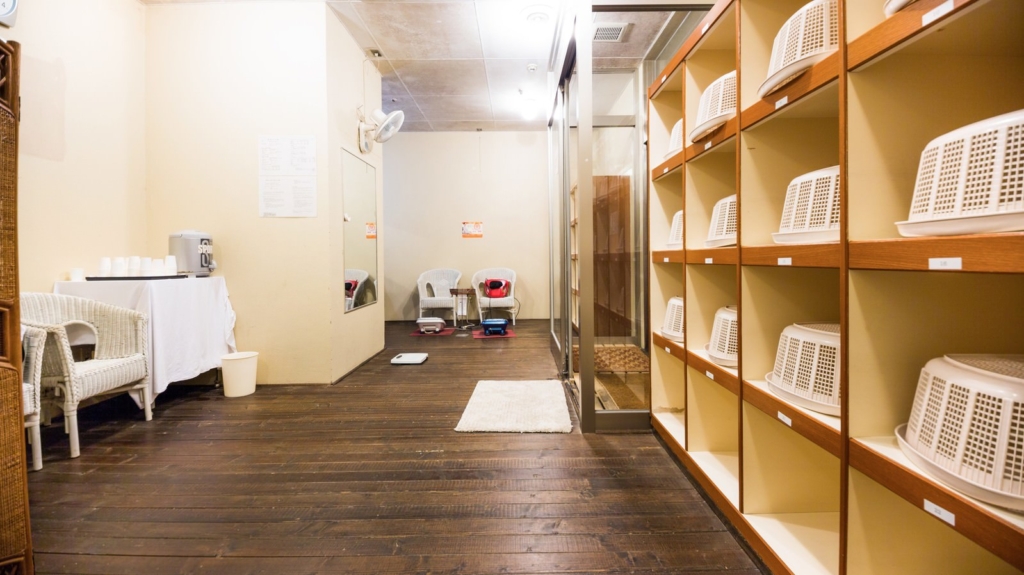
Do not use your smartphone
Naturally, using your cell phone inside the onsen is considered bad manners.
Especially taking pictures with the camera function could invade the privacy of other users, so it is strictly prohibited. Using a smartphone can also disturb the relaxation of other bathers, so it is best to leave it in the locker.
Take the small towel with you
As you may know, the bath towel is not meant to be used in the bath; it is for drying off after getting out of the onsen, so leave it in the locker or changing area. Only take the small towel into the bathing area, which you can use to cover your body and wash yourself (As mentioned later, that towel should not be placed in the bathwater).
Entering the bathing area
The onsen is a shared space used by many, and it is not a private area. It is always necessary to be considerate in your actions so that other users can enjoy their onsen experience.
Always wash your body first!
Since the onsen water is shared by everyone, it must be kept clean. Therefore, there are some things you must do before entering the bath: washing your body first!!
It is good etiquette to thoroughly remove dirt and sweat before entering the onsen. By keeping yourself clean before entering a public bath, you help maintain an environment where other users can also enjoy their time. In Japanese onsen culture, consideration for cleanliness is especially important.
In the washing area, showers and taps are lined up in a row. Find an empty shower, sit in front of it, wash your body with the small towel, and wash your hair if necessary. Afterward, be sure to rinse off any soap or shampoo bubbles from your body, and it is desirable to leave the shower area clean for the next person after use.
Do not wash your body in the onsen water
As mentioned earlier, the onsen is a shared space for other bathers to warm up and relax. Keep in mind that it is not water for washing your body. Washing your body in the onsen will create bubbles and dirt floating in the water, making it unsanitary and unpleasant for other users, thus violating etiquette.
Do not rinse your hair in the onsen bath
Rinsing your hair in the bath is also not allowed. Wash your hair in the washing area and rinse thoroughly.
Additionally, those with long hair should tie it up to prevent it from getting into the water.
Do not immerse your towel
It is etiquette not to dip your small towel used for washing your body in the bath. This is similar to the bathing suit mentioned earlier; no matter how thoroughly the towel has been rinsed, it may still cause discomfort to other users. Therefore, keep that towel outside the bath.
In Japan, it is common to see people placing a small towel on their heads while soaking in the bath. This is often seen in onsen scenes in Japanese TV dramas and movies and is thought to be a manner of keeping the small towel out of the bath. Personally, I do not particularly like this practice and have never done it, as it feels outdated. Since a towel can accidentally fall into the bath, I believe it is sufficient to keep the small towel placed outside the bath close to you.
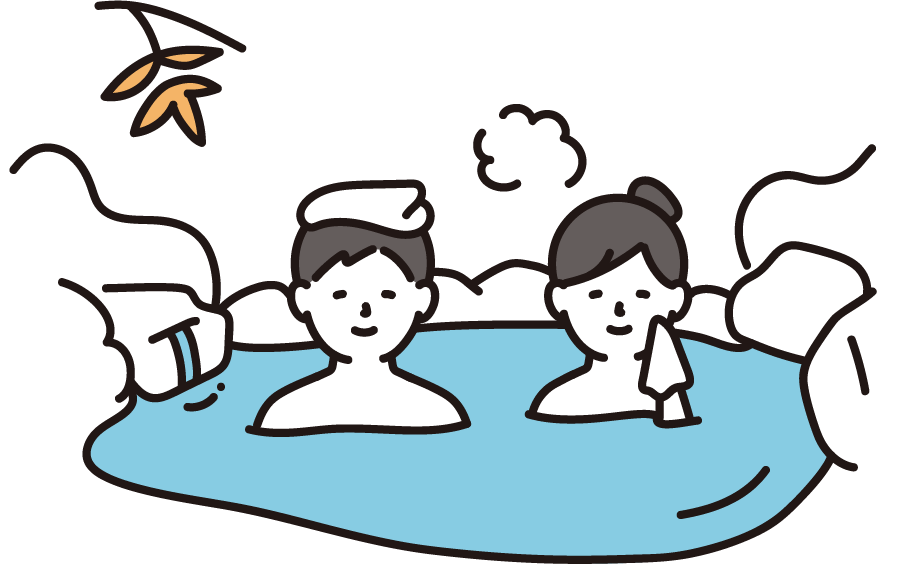
Quiet enjoyment is good manners
It is important to spend your time quietly in the onsen and not disturb the relaxation of other users. Refrain from talking loudly or laughing; conversations should be kept to a low volume. Onsens are places for seeking healing for the body and mind, and a sense of tranquility is required.
Do not swim
Swimming in the onsen bath is also a violation of etiquette. The onsen is a place for relaxation, not a swimming pool. Swimming can create splashes, bothering other users, and there is also the risk of slipping and falling on the slippery bottom of the bath.
Do not shave or wax
Shaving or waxing (hair removal) in the onsen washing area is considered bad manners as it shows a lack of consideration for other guests. If necessary, it is appropriate to do so in your accommodation room or in the washbasin area of the changing room, if permitted.
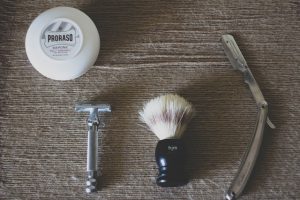
Do not dye your hair
Dyeing your hair in the onsen washing area is strictly prohibited. Hair dye can splash and cause dirt for other users and the facilities, so please do your dyeing at home or in a beauty salon.
Enjoying multiple baths
At onsen facilities with several different baths, you can enjoy various temperatures and mineral compositions in sequence. Depending on the onsen, you might find baths with the natural spring water, cooler or hotter baths, baths infused with herbal ingredients, as well as open-air baths or jacuzzis, each offering a unique experience. Take your time to explore the diverse baths unique to onsen, find the water that suits you, and enjoy a moment of relaxation for both body and mind.
Onsen during menstruation
It is generally considered good manners not to enter an onsen while menstruating. Some tampon packages in Japan state that you can enjoy an onsen while using a tampon, but it is essential to take precautions to avoid soiling the facility or disturbing other guests.
By booking a room with a private outdoor bath, you can enjoy a more personal onsen experience (but still be careful not to soil the facility). Alternatively, you can enjoy the onsen atmosphere by using foot baths or other facilities.
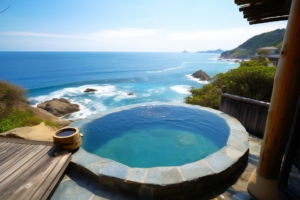
Onsens might refuse your tattoos …
In Japan, many onsen facilities traditionally avoid allowing tattoos, and you may be refused entry if you have them. While in the West, tattoos are often seen as a fashion statement, and their popularity is increasing in Japan as well, there remains a longstanding negative view of tattoos in Japanese culture. This perspective is rooted in the belief that public bathing areas, such as onsen and swimming pools, are places for relaxation, and exposing tattoos may disrupt that environment.
Returning to the changing room
When moving to the changing area, be very careful as the floor can be slippery. It’s recommended to briefly dry off your body with a small towel before returning to the changing area. This helps prevent the floor from becoming soaking wet, ensuring a more comfortable experience for everyone.
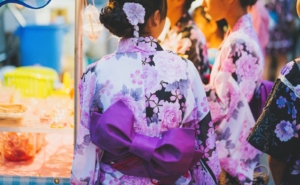
What to do if you encounter problems
Since each onsen may have its own unique rules and etiquette, if you are unsure about something, it’s best to check with the staff. If you feel unwell or dizzy, do not hesitate to leave the bath and contact the staff, prioritizing your safety.
